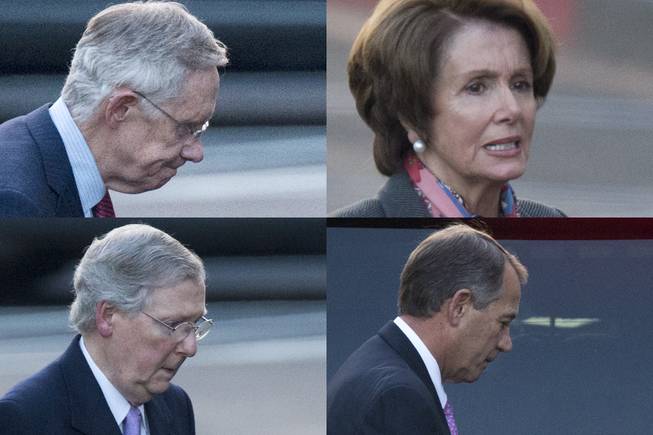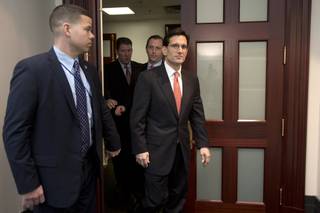
Evan Vucci / AP
In this combination of photographs, Senate Majority Leader Harry Reid of Nevada, House Minority Leader Nancy Pelosi of California, Senate Minority Leader Mitch McConnell of Kentucky. and House Speaker John Boehner of Ohio leave the White House separately in Washington, Friday, Dec. 28, 2012, after a closed-door meeting between President Barack Obama and Congressional leaders to negotiate the framework for a deal on the fiscal cliff.
Tuesday, Jan. 1, 2013 | 3:24 p.m.
Related stories
- Political brinksmanship still threatens US economy
- House expected to send fiscal cliff deal back to the Senate
- Why lawmakers’ failure to beat fiscal cliff deadline might benefit them
- Grand bargains give way to legislative quick fixes
- White House, Senate Republicans reach ‘fiscal cliff’ deal
- Biden and Reid take good cop-bad cop approach to negotiating with Republicans
- Payroll tax hike to take $1,000 bite out of average worker’s annual pay
- Country to head over fiscal cliff as lawmakers continue negotiating
- More Sun political news
In Hollywood's infamous portrayal of the Old West, high noon was a time of reckoning, when lawmen and their opponents met in the town square for a final shootout.
In Congress, high noon is the hour of reckoning for lawmakers in the 112th Congress, who have until then on Jan. 3 to act on a fiscal cliff deal before their time expires and their unfinished business is officially pitched into the next congressional session.
It's looking more and more like they may miss that deadline.
On Tuesday afternoon, House Republicans registered their frustration with the fiscal cliff deal struck between Senate Republican Leader Mitch McConnell and Vice President Joe Biden on New Year's Eve and passed in the Senate by a very bipartisan 89 to 8 vote in the early hours of New Year's Day, by threatening to change it and kick it back to the Senate.
"I don't think I can go home and look my folks in the eye on that bill," Nevada Rep. Mark Amodei told the Sun. "I'm not afraid to vote for some [tax] revenues, but I want to see some meaningful stuff on spending and the debt."
House Republicans are planning to propose an amendment to outfit the fiscal cliff deal that passed the Senate with hundreds of billions of dollars worth of spending cuts, and spent Tuesday afternoon trying to determine just what that would be and whether they would be able to get 218 votes for it.
The bill, as passed by the Senate, would permanently revive the Bush-era tax cuts for income levels up to $400,000, or $450,000 for couples filing joint tax returns. Above that, tax rates would be left to rise from 35 percent to 39.6 percent, starting with 2013 tax returns.
The deal also extends unemployment benefits, sales tax deductions, mortgage debt relief deductions and energy tax deduction for a year, and makes permanent a correction to the alternative minimum tax and the $5 million exemption on estate taxes, which is also pegged to inflation.
But House Republican lawmakers say it doesn't make enough spending cuts. They are also balking that the deal as structured would put off discussions about undoing sequestration cuts – federal spending cuts Republicans don't like – until such time as Congress would also have to give the president increased borrowing authority so the country doesn't run into its debt ceiling.
If House Republicans successfully amend the bill, they will send it back to the Senate tonight, where lawmakers have only about a day and a half left to register a response.
Considering how difficult it was for senators and the White House to strike the first agreement, it isn't likely that they will move swiftly to adopt an amended package that is more palatable to the House GOP.
Republicans weren't the only ones who had problems with the fiscal cliff deal. So did Senate Democrats, many of whom objected to the $450,000 tax cut threshold. Many Democrats, coming off wins in November 2012, claimed that election had given the Democrats a mandate to see the $250,000 tax cut level they wanted realized as the threshold above which rates would be allowed to rise to 1990s levels.
Tax rates officially rose at all income levels at midnight, when Congress missed the self-imposed Jan. 1 deadline to stave off the change – but lawmakers still have a few weeks before people start to see higher tax rates reflected in their paycheck deductions or the negative effects of sequestration cuts play out across the economy.
But if the clock changes to a new Congress, that task may become much harder.
If the 113th Congress begins without a resolution, the Senate bill – overwhelmingly accepted as it was – will be null and void. White House officials and Senate leaders will have to re-whip that vote in the new Congress, a task made harder if the House rejects the bill as it passed the first time.
The Democrats may also consider their hand strengthened in a new Congress, as they will have more seats at 12:01 p.m. Jan. 3 than they do at 11:59 a.m., thanks to gains made in the Senate and House in November.
And then there's the matter of the whole new crop of incoming lawmakers, who will have to be brought up to speed quickly on the particulars of the entrenched debate.
Some lawmakers are only getting sporadic updates, like incoming Nevada Rep. Dina Titus, who spent New Year's in the West Virginia mountains and told the Sun on a scratchy cellphone conversation that she was doing as best she could to stay on top of the moment-to-moment changes with faulty phone and internet, but was planning on readying herself for what might come in the 113th when she got back to Washington, D.C. on Wednesday.
Other incoming lawmakers have been keeping very close tabs on the process, like incoming Nevada Rep. Steven Horsford. He's been in Washington, D.C. since last Thursday, getting ready for this Thursday's swearing in – and told the Sun he's been non-stop glued to the news and updates from the House Democrats as to how the fiscal cliff is progressing.
"[The fiscal cliff] is clearly a part of what the new Congress will be expected to act on," Horsford told the Sun on New Year's Eve, remarking that it appeared to him as if time was running out on the 112th. "The 113th Congress will definitely have to take action early and my priority will be that we do enact the middle class tax cuts that are necessary."
Horsford said he still supported the $250,000 tax threshold as ideal, but wouldn't dismiss a deal with a higher number out of hand.
"Whether or not the threshold amount stays at the 400, 450 mark, I'll wait and reserve judgment until I see it," Horsford said. "When you have to compromise you don't get all of what you want."
Whether those lawmakers are asked to vote soon after they are sworn in Thursday depends on what happens in the House Tuesday night, and how the Senate responds.
A spokesman for House Speaker John Boehner would not say whether Republicans planned to allow a vote on the underlying fiscal cliff deal that passed the Senate early Tuesday morning, if Republican efforts to support an amendment to it failed.
If the House does successfully amend the bill that passed the Senate, however, that is where the process will end for the 112th Congress.
At 6 p.m. EST, Reid adjourned the Senate until Wednesday at noon, effectively leaving the House to its own devices for the rest of Tuesday night.
"We're not going to take up the bill if they amend it," a Democratic aide in the Senate said, citing the logistical concerns of the Senate clock and the unlikeliness of being able to secure as strong and wide a bipartisan majority on any substitute measure, no matter how long lawmakers took to renegotiate it.
Politico is reporting that Boehner is going to let the underlying bill go for an up or down vote if the amendment doesn't pass.


Join the Discussion:
Check this out for a full explanation of our conversion to the LiveFyre commenting system and instructions on how to sign up for an account.
Full comments policy